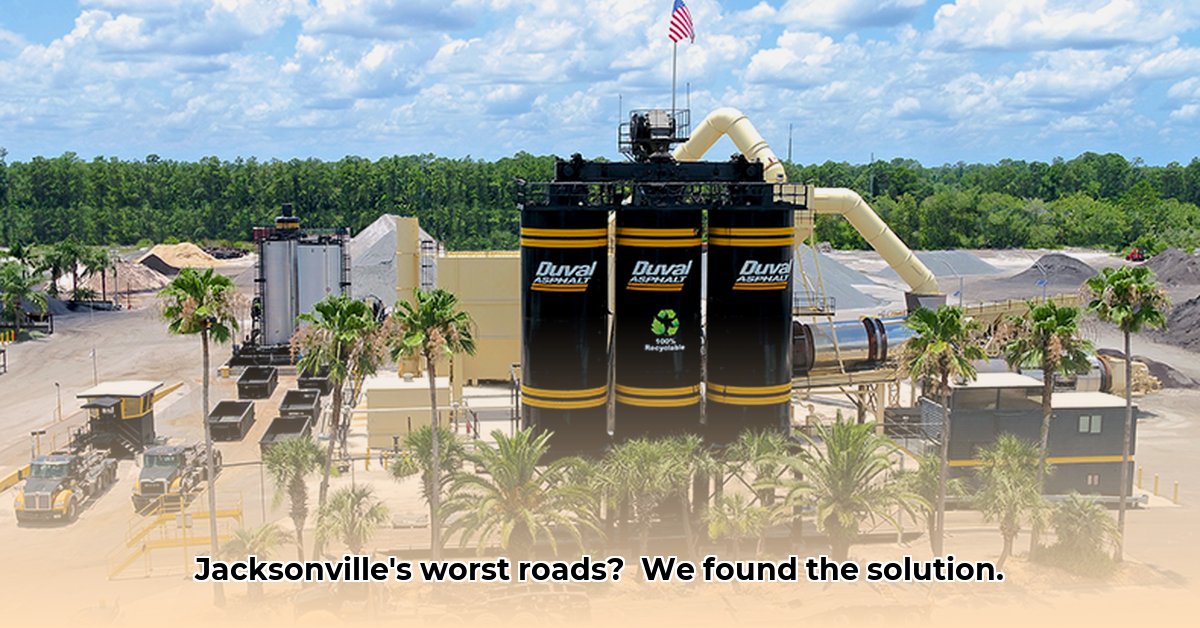
Duval Asphalt holds a significant position in Jacksonville's paving industry, operating from its Philips Highway location. This article analyzes its operations, market standing, and future prospects, offering insights for stakeholders. We will explore operational efficiency, competitive dynamics, and emerging trends impacting the Jacksonville asphalt paving sector.
Understanding Duval Asphalt's Operations
Duval Asphalt's operational strategy appears focused on efficiency, prioritizing larger-scale projects and weekday operations. This approach maximizes productivity but may limit responsiveness to smaller, urgent repair needs. More data is needed to accurately assess this trade-off. The company's multiple plant locations across Jacksonville offer considerable geographic reach, enhancing accessibility for clients throughout the city. However, a detailed map illustrating plant locations and service areas would provide critical context for evaluating logistical efficiency and market coverage. How effectively does this network serve diverse project needs across Jacksonville's geography?
Jacksonville's Asphalt Market: Competitive Landscape
Determining Duval Asphalt's precise market share within Jacksonville requires further investigation. The company's multiple plants suggest a substantial market presence, aiming for widespread coverage. Crucial missing data includes the identification of key competitors, their relative market shares, and a comparative analysis of service offerings. This understanding is essential to accurately assess Duval Asphalt’s competitive advantage.
The asphalt industry is experiencing considerable evolution. The increasing demand for sustainable asphalt and specialized paving solutions (e.g., for bike lanes or pedestrian areas) presents both challenges and opportunities. Duval Asphalt's ability to adapt to these trends will be pivotal. Will they invest in eco-friendly technologies? How successfully will they diversify to serve niche markets? This will significantly influence their long-term growth and profitability.
Actionable Insights: Strategies for Stakeholders
This analysis provides actionable insights for Duval Asphalt and other market players:
| Stakeholder | Short-Term Actions (0-1 Year) | Long-Term Strategies (3-5 Years) |
|---|---|---|
| Duval Asphalt Management | Evaluate the potential for extended operating hours. Conduct comprehensive market analysis to identify underserved sectors and unmet needs. | Invest in R&D for sustainable and specialized asphalt solutions. Develop a targeted marketing strategy to engage specific customer segments. |
| Customers | Plan projects well in advance to align with Duval Asphalt's scheduling. | Cultivate long-term partnerships to ensure reliable service and pricing benefits. |
| Competitors | Analyze Duval Asphalt's service offerings, pricing, and customer base to identify potential market gaps. | Develop innovative, differentiated paving solutions emphasizing sustainability or niche applications. |
The Big Picture: Unanswered Questions
The analysis is limited by the absence of detailed operational data. Further research should focus on:
- Detailed Operational Data: Capacity of each plant, daily output, asphalt types produced, and precise service areas.
- Competitive Analysis: Identification of major competitors, market shares, strengths, weaknesses, and comparative service offerings.
- Customer Segmentation: Understanding the types of projects serviced (e.g., large-scale highway vs. smaller municipal projects).
- Pricing Strategies: A comparative analysis of pricing structures with competitors.
Addressing these gaps will enable a more comprehensive evaluation of Duval Asphalt's position and future outlook within Jacksonville's paving market. This deeper understanding will inform better strategic decisions for all stakeholders.
How to Improve Asphalt Plant Scheduling for Maximum Efficiency
Duval Asphalt's operations offer a compelling case study in Jacksonville's paving industry. Optimizing asphalt plant scheduling is crucial for enhancing efficiency and competitiveness.
Operational Efficiency: Maximizing Plant Performance
Several factors influence operational efficiency. Knowing the number of plants, daily operating hours, and their geographical distribution is critical for assessing logistical advantages and disadvantages. A detailed map showing plant locations relative to major construction sites would illuminate potential transportation cost savings and responsiveness to project demands.
Market Dynamics and Future Trends
Accurate market analysis requires detailed information not currently available. This includes comprehensive data on competitors, market share breakdown, and identification of underserved niches (e.g., sustainable asphalt, specialized paving solutions). Forecasting future trends, such as rising fuel costs and stricter environmental regulations, will also be important for strategic planning.
Actionable Steps for Enhanced Efficiency
Key Takeaways:
- Advanced Scheduling Software: Implement sophisticated scheduling software (e.g., PlantDemand1) to optimize production flow and reduce delays.
- Preventative Maintenance: Regular maintenance minimizes downtime and extends equipment lifespan, reducing long-term costs.
- Employee Training: Focused training programs enhance safety, operational expertise, and productivity.
- Automation: Explore automation possibilities for repetitive tasks to increase efficiency.
- Energy Management: Analyze energy consumption, explore renewable energy sources, and implement strategies for waste reduction.
- Supply Chain Optimization: Implement efficient procurement and inventory management to minimize delays and waste.
- Data-Driven Decisions: Regularly collect and analyze operational data to inform ongoing improvements.
By implementing these short-term and long-term strategies, Duval Asphalt can significantly enhance operational efficiency and strengthen its competitive position within Jacksonville's dynamic paving market.